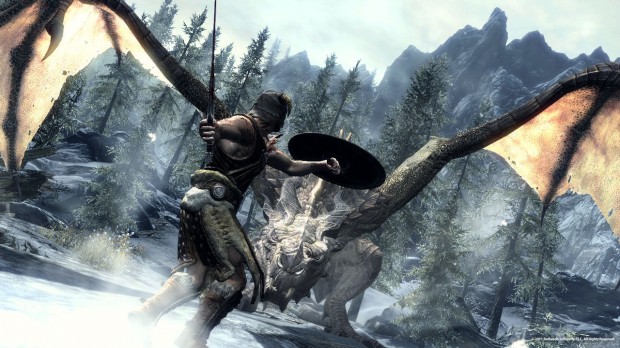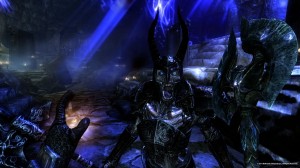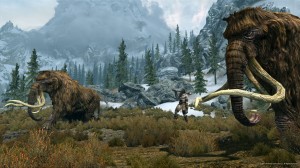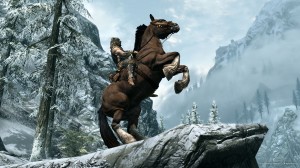
 There is a certain childlike glimmer in the hearts of gamers, nerds, geeks and anyone who has ever rolled a d20 (or even knows what that means) when they are told that they can slay a dragon. Dragon slaying, since the dawn of civilization, has always been the quintessential “hero’s victory,” the type of warm, youthful nostalgia that bubbles up at the resolution of a good story:
There is a certain childlike glimmer in the hearts of gamers, nerds, geeks and anyone who has ever rolled a d20 (or even knows what that means) when they are told that they can slay a dragon. Dragon slaying, since the dawn of civilization, has always been the quintessential “hero’s victory,” the type of warm, youthful nostalgia that bubbles up at the resolution of a good story:
“The dragon was slain by the brave knight and the people of the town were saved. The end.”
However, with Elder Scrolls V: Skyrim, developed by Bethesda on their new “Creation” engine, there is no “The End,” just more “and then.”
“The dragon was slain by the brave knight and the people of the town were saved and then the brave knight had a cash fight in a bar with a butch female warrior named ‘Uthgerd the Unbroken’ who became his loyal second after being beaten and then he and Uthgerd rooted out an enclave of vampires in the side of a snowy mountain and then he became a vampire one night at the inn and fed upon Uthgerd, killing her accidentally, and then the town began to hunt him, as he was now feared far and wide as a monstrous vampire and then he became a freelance baker, baking apple pies in the dead of night and then—”
The tale of Skyrim is never-ending and never the same as anyone else’s due to its intuitive “Radiant Story” and “Radiant AI” systems, first introduced in Elder Scrolls IV: Oblivion(2006), but perfected here. It keeps track of not only where the player has explored, but what they’ve done, who they’ve ticked off and who they’ve killed so each quest can be tailored specifically to bring them somewhere new or to further the plot in an organic way. For instance, if the player hasn’t explored a nearby dungeon, of the 150 dungeons within Skyrim, the next side-mission they receive will send them there.
The world is alive. Townsfolk go about their daily routines independent of the player, interacting with each other, sharing gossip about recent goings on, working the blacksmith’s forge, cooking dinner, sitting down for meals, hunting for food, getting into fights, hanging out down at the local inn, the list is endless.
 If the player goes rummaging around a prominent and wealthy NPC’s house, and they get caught? Expect some mercenaries in the future, carrying a contract to bring you in, dead or alive, to be “made an example of,” signed by none other than said wealthy NPC.
If the player goes rummaging around a prominent and wealthy NPC’s house, and they get caught? Expect some mercenaries in the future, carrying a contract to bring you in, dead or alive, to be “made an example of,” signed by none other than said wealthy NPC.
There is an infinite quest system, even after all of the main quests have been completed. That is not to say that the main quests are boring. These story missions take you across the dazzling and gorgeous Nordic-influenced lands of Skyrim as one of ten discernable races with a skill system based on what you focus on rather than what you traditionally level up. Like big axes? Use big axes and get better at two-handed weapons. Like sneaking? Sneak more and get better at sneaking. This common-sense leveling system, coupled with a perk tree loosely based on the Fallout series, is an intuitive and effective approach to RPG progression.
Melee combat, dual-wielding included, is also punctuated by random finisher moves a la Fallout. Magic can also be used with both hands, simultaneously, resulting in devastating effects. Dragon shouts, learned by finding walls of runes written in Dragon language, and expanded upon by killing dragons (and stealing their souls), can let you do anything from breathing fire to charging forward at super-speed to knocking enemies on their butts with a sonic boom.
Skyrim knows what people love. It supplies the player with an infinite amount of dragons to slay. Smart move, Bethesda.
These fearsome beasts roam the countryside, terrorizing everything in their path, the player included. They can, and will, attack anywhere, anytime, whether the player’s prepared or not. If the player happens to be in the middle of fighting a gang of trolls on top of a mountain in the middle of a snowstorm with no health or magic or stamina potions? Too bad. Before the player can say “Hark, there be a dragon!” a troll is already snatched up in the dragon’s claws and flung, screaming, into the snowy abyss below.
Long have Bethesda titles been back-handed masterpieces presenting an epic overworld filled with random madcap and wonderment, but failing to address key, nigh game-breaking flaws and needless tedium that oftentimes ruined the whole experience. Finish a quest before finding the quest-giver? Hope that save-game wasn’t important, because it’s broken. Conversations, as well, mostly felt dragged on and obnoxious with that token dramatic close-up for every single NPC. Even people chewing the fat with you about the local armory’s address would receive the same over-the-top treatment.
 The vast wasteland of video game message boards, cheeky forums and tech support answering machines cried out.
The vast wasteland of video game message boards, cheeky forums and tech support answering machines cried out.
Bethesda listened, and gave the masses Skyrim, devoid of locked-in conversations, lifelessness, pointless fetch quests, dated graphics and various other annoyances.
Aside from some humorous technical glitches and exploits (putting buckets on NPCs heads to rob their house while they’re hilariously blinded), Skyrim is a solid release and has immediately clawed and fire-breathed its way into the running for game of the year.

best game. ..ever! (and a pretty great review) :-)